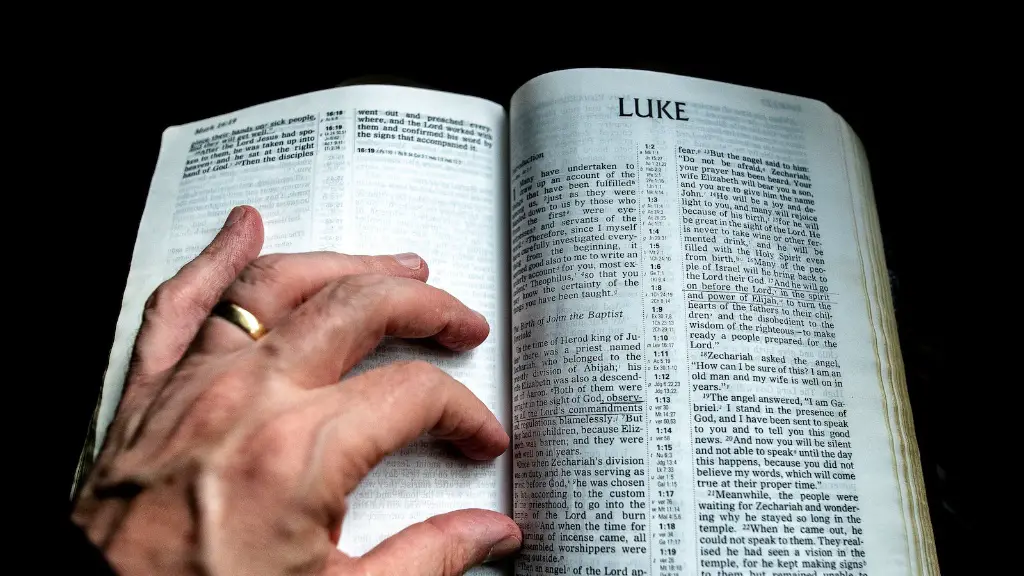Background Information
Methuselah is a figure in the Bible that the majority of people know, but the exact details about whom he is or why he is important can be difficult to find. Bible scholars believe that Methuselah is described in the book of Genesis as being the oldest man who ever lived. He is mentioned as the son of Enoch and the father of Lamech, and the Bible states that he lived for 969 years; an amazing feat that no one has ever matched.
In most cases, scholars believe that the Bible is a reliable document to go by; however, the idea of people living for such long periods of time might be too much for some to accept. It is speculation that this extremely long lifespan could be a metaphor for the endurance of a person and their faith in God. Somehow, through the generations, Methuselah’s name has remained due to his unusual lifespan; but, what can be gathered from this character in the Bible?
Biblical Meaning
Methuselah is derived from two Hebrew words; ‘methu’ meaning man and ‘shalach’ meaning to bring forth or to send. This provides insight into what the ancient Jewish understanding of Methuselah was. Essentially, it was their belief that Methuselah was sent forth to bring something to humanity. Interestingly, what he brought forth can be attributed to longevity. He was well known for his advanced age, and through this often repeated story in the Bible, life spans of several hundred years were associated with him.
Methuselah was also present in the Bible during the Great Flood. He was nearly 600 years old when the Flood began, and in some versions of the story, Noah’s family was the only family to avoid being swept away in the Flood. This suggests that God had some purpose in preserving the line of Methuselah during this time. It could be argued that this is an example of God protecting people of faith at a time when their trust in Him was most needed.
Analyzing Textual Evidence
When looking at textual evidence, there are certain elements that can help a person gain a better understanding of the Metuselah story. For example, the biblical texts mention that Methuselah was the son of Enoch and the father of Lamech. Both Enoch and Lamech are known for significant religious roles within the text. Enoch is the first person in the Bible to not die, and Lamech’s name is associated with the Founding Fathers of the Torah.
In addition, the Bible often mentions Methuselah in the same breath as Noah. Noah, himself, was described as a righteous and godly man, which some scholars believe to be alluding to a direct line of faith from Enoch, through Methuselah, to Noah. It could also be argued that Methuselah’s spiritual leadership was a part of God’s divine plan.
Perspectives From Experts
From a theological standpoint, experts believe that the story of Methuselah helps to shed light on the character of God, who the Bible describes as being gracious and compassionate to all mankind. In the Methuselah story, there are numerous references to God’s plan being carried out, suggesting that even “unworthy” people, such as Methuselah, can still have a part to play in God’s ultimate plan.
This viewpoint can also be seen in the words of theologians such as Augustine and Aquinas. Both of these men argued in favor of the idea that Methuselah’s long life was an example of the result faith can achieve in life. In the words of Augustine, the example of Methuselah was valuable for pointing out “the necessity of belief in God, by His power having extended man’s life so far beyond the ordinary limits.”
Exploring the Significance
From a Christian perspective, Methuselah can be seen as an example of what can be achieved through faith in God. In this way, the story of Methuselah is an example of God’s life-extending and life-sustaining power, even in the face of great adversity. He also serves as a reminder that with faith, and with God’s help, one can achieve what might seem impossible.
In addition, one can see the faith of Methuselah in the genealogy of Jesus, as it is in this very line of people, beginning with Methuselah and ending with Jesus, that Jesus’s ministry begins in the Bible. This could be an indication of how the presence of Methuselah and his faith in God allowed the story of Jesus to begin, and how it is through the faithful followed his example that we have the story of Jesus today.
Examining Literary Evidence
When examining literary evidence, one can see that Methuselah is mentioned not just in the book of Genesis, but also in Psalms, Proverbs, Job, and Sirach. Notably, Psalms is a book that is focused on prayer and trust, and so the mentioning of Methuselah brings a special significance to the passages of Psalms. In addition, his name appears in the language of faith in Proverbs and Job, which underscores his role as an example of faith in the face of difficult times.
Synthesizing Information
When synthesizing the information from the textual and literary evidence, it is clear that Methuselah played a special role in the Bible. He represented faith in a difficult time, allowing the stories of the Bible to go on and the plan of God to be fulfilled. He was also a part of Jesus’s genealogy, emphasizing his connection to God’s plan of salvation for humanity.
Another aspect of Methuselah’s role in the Bible is his example of endurance through faith. His long life is portrayed as an example of what can be achieved through faith in God, and this faith that is seen in Methuselah is echoed in the lives of people throughout the Bible.
Exploring Cultural Insights
Methuselah is often used as an example of long-lived faith, not only in the Bible, but in other aspects of culture as well. In Jewish texts, for example, his name is often cited as an example of righteous living and his long life is seen as an extension of his faith.
Methuselah also made his way into other cultures as well. In Greek mythology, Methuselah’s name is often compared to the Greek legend Atlas, who was also known for his longevity. Similarly, in Celtic culture, Methuselah’s long life is compared to their own mythological figures who were known for longevity.
Connecting to the Present
The example of Methuselah is still important today, especially within the Christian church. By looking to the life of Methuselah, it can be seen how faith can bring about great blessings. Faith can create longevity in life, and by having faith in God, one can go on to achieve great things.
In addition, Methuselah’s faith can be seen as an example of enduring faith in the face of difficult times. Such faith gives hope to people of all cultures, and it is this faith that binds us together and brings us closer to God.
Evaluating the Impact
Evaluating the impact of Methuselah’s story reveals both a tangible and intangible impact. On the one hand, his story is one of endurance and faith, reminding us that faith is a powerful force that can lead to blessings. On the other hand, his story also speaks to the power of legacy and the importance of leaving a legacy that can be shared by all people.
Ultimately, Methuselah’s story serves as an example of the power of faith, reminding us that faith can endure through difficult times and bring blessings, if we are willing to cling to it. It also speaks to the power of legacy and how the faith of just one person, when shared with others, can still have an impact today.
Exploring Interpretations
Methuselah’s story has been interpreted in various ways, as different cultures have assigned different meanings to the character. In some cases, Methuselah is seen as a symbol of endurance and faith that can bring about blessings. In other cases, his long life is seen as a sign of God’s grace and mercy in providing people with the opportunity to lead a long life.
The metaphors, symbols, and ideas associated with Methuselah vary but they usually point to the importance of having faith and trust in God. This is especially true for those who follow the Christian faith and look to the Bible for guidance and comfort. At the end of the day, it is the faith that Methuselah and those like him had that allows for a legacy of faith to still resonate today.
Reconciling Differing Beliefs
When looking at the many interpretations of Methuselah’s story, it is important to remember that religion and faith can bring different perspectives on how to look at the same story. For example, some may see Methuselah’s long life as a result of his faith in God, while others might view it as a sign of God’s mercy and grace.
No matter what the interpretation is, however, it is important to remember that there is power in unifying differing beliefs and finding common ground. After all, the goal of religion and faith should be to bring people together and provide them with hope and comfort. By reconciling our understanding of Methuselah’s story, we can embrace the many interpretations of the same story and use them to bring people together, rather than divide them.



